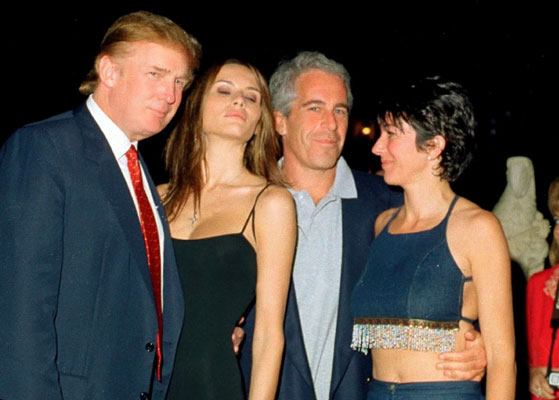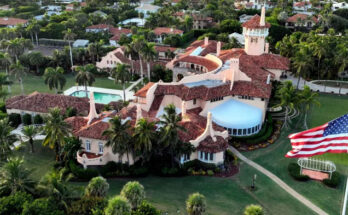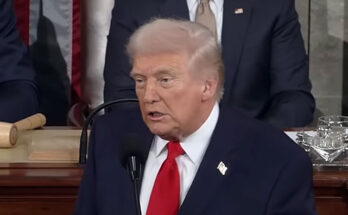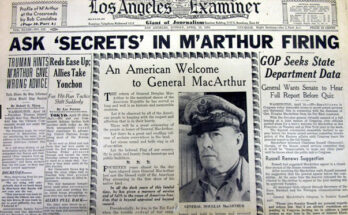Column By Mike Bibb
No public evidence of any wrongdoing on [President Donald] Trump’s part” regarding involvement with sex trafficker Jeffrey Epstein.
The Washington Post, July 17, 2025
The above admission by The Washington Post has been included in the growing list of media organizations that are, reluctantly, coming to the realization that President Trump, while knowing and occasionally attending public events with Epstein, was not involved or participated in any way in his perverted sex trafficking with young girls.
A fact Trump has repeatedly reminded us.
Adding further influence to the topic, the WaPo is not normally a pro-Trump organization. An announcement of this sort must feel to them like being stung by a Murder Hornet.
Actually, Trump severed ties with Epstein years ago when he found out about Jeff’s sexual proclivities with underage girls.* He also banned him from his Mar-a-Lago Resort in Florida.
While in custody awaiting trial on various charges in a New York City jail in August 2019, Epstein was found dead in his cell. Supposedly, he committed suicide by hanging himself with a bed sheet.
Not everyone believes that’s what happened. I have doubts, myself. There are simply multiple suspicious circumstances surrounding Epstein’s final few hours of incarceration. Including grainy jail videos, sleeping guards, and conflicting opinions by the coroner reviewing Epstein’s autopsy.
His girlfriend and partner in these escapades, Ghislaine Maxwell, is presently serving a 20-year prison sentence. She’s agreed to be interviewed by Trump’s Department of Justice, but it’s uncertain she will provide any beneficial information or evidence.
Fearing, perhaps, that if she reveals too much, she might end up like Jeff.
She’s already mentioned last month to Deputy Attorney General Todd Blanch that she hasn’t seen Trump do anything inappropriate.
Jeffrey Epstein was a seedy character. His rise from relative obscurity to fame, fortune, and infamy was a twisting entanglement with the academic world, Wall Street, and self-promotions of various descriptions.
In essence, a very successful and wealthy con artist.
However, he tossed caution to the wind when he began dabbling in the underworld activities of child sexual prostitution — a lucrative but limited enterprise whose elite clientele is heavily dependent upon privacy, secrecy, and security.
As a result, Epstein’s business model included exclusive island retreats, confidential city apartments, and a New Mexico ranch hideaway, accessible by his own jet service.
There’s speculation that a “client’s list” of prominent and wealthy patrons of Epstein’s sex operations exists, but remains sealed by court order. Apparently, Grand Jury Transcripts are very difficult to obtain without a court first deciding the importance of the request and if it would alter the outcome of a case.
It’s already been established that several recognized Democrats had ties to Epstein. Further revelations would not be beneficial and, I imagine, unwelcome.
Given the fact Donald Trump has been a constant target of Democrats for the past decade, his life continually under assault by the media, it comes as an awkward surprise whenever the press admits it can find “no public evidence of any wrongdoing” regarding his alleged association in a criminal activity that has attracted the public’s attention for 15 or 20 years.
And still going on six years after Epstein’s death. What’s the fascination?
I’d guess it’s the same old time-worn modus operandi — sex, privilege, privacy, money, and more sex. If there’s a market for this stuff, there will be a supplier. It’s just a matter of how much a customer is willing to pay, how exclusive the services are, and how private the arrangement is.
An ordinary trick in Las Vegas is not expected to offer the same thrills as an expensive rendezvous with underage girls on a private Caribbean island.
After all, a customer’s social standing, political and business influence, and community integrity could be soiled if the public were to learn some of Jeff’s clients may have backgrounds of state and national prominence.
A similar scenario unfolded in the White House when President Bill Clinton finally admitted he did, in fact, have “sex with that woman” — a young female intern. Bill was impeached but not convicted. He finished his two terms, but the stain is still on the dress — and his time in office.
Yet, in Trump’s situation, Democrats remain determined to link him to the Epstein saga, in spite of evidence to the contrary.
Not surprising, considering Dems are floundering, have a shallow bench of candidates, and continually serve up the same tired, unappealing menu of political appetizers.
Their spiel is stale, and folks have figured it out. Consequently, they’ve repacked the spoiled treats in a shiny new socialist wrapper, handed out by smiling hucksters who are either totally ignorant of their product’s contents or really believe their own delusional b.s.
The opinions expressed in this editorial are those of the author.
*AI Fact Check on why Trump and Epstein’s friendship ended
In 2004, Donald Trump and Jeffrey Epstein competed in a bankruptcy auction for a Palm Beach oceanfront estate called Maison de l’Amitié, previously owned by nursing home magnate Abe Gosman. Epstein, who had been friends with Trump, reportedly bid $36 million and sought Trump’s advice on the property, including plans to modify the swimming pool. However, Trump outbid Epstein, securing the estate for $41.35 million through Trump Properties LLC, a move that allegedly infuriated Epstein and ended their friendship. Epstein, according to author Michael Wolff, suspected Trump didn’t have the funds himself and believed the money came from a Russian oligarch, Dmitry Rybolovlev, raising suspicions of money laundering.
In 2008, Trump sold the estate to Rybolovlev for $95 million, more than doubling his investment, setting a record for the most expensive residential sale in the U.S. at the time. Trump claimed he made significant renovations, though he later admitted spending only about $3 million. Rybolovlev never lived in the mansion, demolished it in 2016, and subdivided the land into three lots, which were sold for a combined $108 million by 2019. The deal drew scrutiny, notably from Senator Ron Wyden in 2018, who questioned potential money laundering ties to Russia, though it was investigated but not included in Robert Mueller’s final report on Trump-Russia connections.
Sources differ on details, and Wolff’s claims, based on interviews with Epstein, remain unverified. Trump’s team has dismissed such allegations as false. The transaction’s high profit and timing, amid Trump’s financial struggles, fueled speculation, but no definitive evidence of illicit activity has been confirmed.










